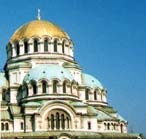 |
Vol 2, No 10 13 March 2000 |
|
|
 C E N T R A L E U R O P E A N N E W S:
C E N T R A L E U R O P E A N N E W S: News Round-up for Bulgaria News from Bulgaria since 6 March 2000 Nadia Rozeva Bulgarian Foreign Minister Nadezhda Mihailova delivered a speech discussing the political status of multi-ethnic countries at a conference in Washington, DC, organized by the Library of Congress and the University of New York. At a lunch given in honor of Mihailova by the world Jewish organization B'nai B'rith, the guests expressed recognition of Bulgaria's role as a factor of stability and tolerance in the region and for the rescue of Bulgarian Jews from the Nazi death camps during World War II. Regional security and cooperation, the Southeast European Stability Pact, NATO and European integration were on the agenda of Mihailova's meetings with Republican senator George Voinovich and Democratic senator Joseph Biden. Oleg Protsenko, a Ukrainian citizen, a suspect in the killing of former Bulgarian Prime Minister Andrei Lukanov was detained early this year in the Russian Rostov region and was extradited to Bulgaria last week. Protsenko's detention was due to the joint efforts of the Bulgarian National Police and Interpol. Lukanov was shot dead in October 1996 in front of the entrance of his home in Sofia. President Peter Stoyanov met with a delegation of some 100 French officers from the institute for training of top defense personnel last week. The French delegation, headed by institute director Vice Admiral Jacques Selerier, paid a three-day visit to Bulgaria as part of a mission entitled "EU and NATO Enlargement and Stability in Southeast Europe," which incorporates Slovakia, Romania and Bulgaria. "It is obvious that the European nations will continue to speak different languages and to have different religious faiths but it is important to stand united in the sphere of politics, human and democratic values," Stoyanov said. The French Vice Admiral expressed hope that Bulgaria will soon become part of united Europe. "Bulgaria and Slovakia have similar goals - both countries want to become full members of the North Atlantic Alliance and of the EU," said Slovak President Rudolf Schuster in front of the Bulgarian Parliament last week. He also added that the process of further expansion of the European and transatlantic structures gives both countries a chance to join a united Europe where democracy will be stable and peace-eternal. Later, the Slovak delegation left for Plovdiv to meet with President Stoyanov. "The working group in charge of the privatization of the Bulgarian Telecommunications Company (BTC) is not ready with its report on the negotiations with the potential buyers," Transport and Communications Minister Antoni Slavinski told the press. The report on the talks with the Greek-Dutch consortium OTE/KPN, was expected to be submitted to the Prime Minister last Thursday. Asked whether a deal would ultimately be signed, Slavinski said, "Probably but not certainly." Bulgaria's gas monopoly Bulgargas said on Thursday it had started the enlargement of the pipeline to Turkey. Two loop additions near the Romanian border with a total length of 90 km (56 miles) will be completed by the beginning of next year, a Bulgargas spokeswoman told Reuters. The construction project without equipment will cost the company under USD 100 million. Bulgargas owns and operates 2200 km (1300 miles) of pipeline network which includes 625 km (370 miles) of transit pipelines to Turkey, Greece and Macedonia. Last year Bulgargas built a stretch of 55 km (34 miles) to Turkey and a 96 km link to Greece and Macedonia and invested more than USD 40 million in increasing the transit network. In a telephone conversation last week, Stability Pact Coordinator Bodo Hombach and Finance Minister Mouravey Radev discussed the idea to put forward the proposal to name the second Danube bridge after the Roman architect Apolonor, who built a bridge over the river between the First and Second century AD. Preliminary estimates showed that the bridge would be 1275 m long and its total cost would be around EUR 160 million. About 600 people gathered in front of the Bulgarian Embassy in Skopje, Macedonia, to protest against decision of the Constitutional Court to declare unconstitutional the Macedonian Organization-Ilinden (OMO-Ilinden-PIRIN). The court's decision was based on Article 22, Paragraph 2 of the Bulgarian Constitution, which prohibits organizations whose activity is directed against Bulgaria's sovereignty and territorial integrity and the unity of the nation. The demonstrators expressed their support of the intention of the separatist party to seek help from international humanitarian and legal institutions. [For more details see this week's article] Nadia Rozeva, 10 March 2000 SOURCES:
|
|
![]()
Copyright © 2000 - Central Europe Review and Internet servis, a.s.
All Rights
Reserved